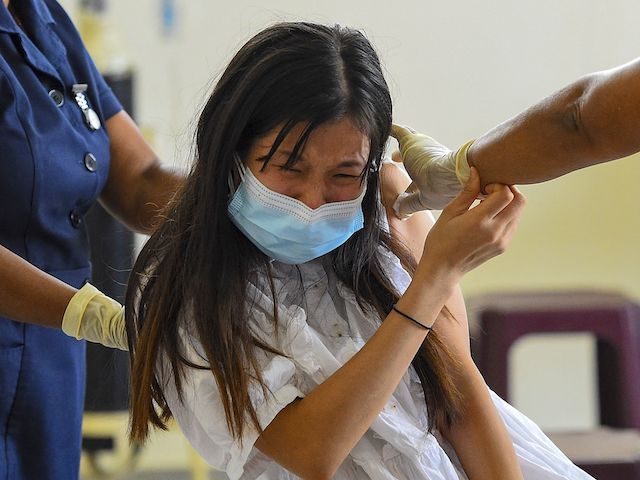Dr. Zhang Wenhong, head of the coronavirus clinical team in Shanghai, told Chinese state media on Sunday it might be possible to lift restrictions on overseas travel “next spring.”
The Chinese government claims it wiped out the coronavirus months ago, but is evidently determined to keep travel restrictions in place until most of the population has been vaccinated – a goal that looks difficult to reach because many Chinese citizens wonder why they should receive experimental vaccines against a disease that has supposedly been eliminated.
“Given China’s current vaccination speed, I think we will have an immune barrier next spring. Then we will have to communicate with other countries,” Zhang said on Sunday.
“If the major economies in the world reach an immune barrier at the end of this year, they will definitely reconnect. Then China will face the challenge of whether we can open up to other places,” he said.
The South China Morning Post (SCMP) quoted Zhang warning “the overall numbers vaccinated in China is still relatively low” and China risks “falling behind other major economies when it came to reopening borders unless these targets were met.”
The Chinese government claims to have administered 142 million doses of Chinese-made vaccine as of Monday, with the goal of inoculating 40 percent of the population by June and 70 or 80 percent by early 2022. The U.S., U.K., Israel, and some Gulf Arab states are well ahead of China in terms of inoculating much smaller populations, while the U.S. has administered more vaccinations in total than China.
The Chinese government has approved five different locally-produced vaccines to date, some of which require three doses to achieve nominal protection against the coronavirus. State media claims China can now produce five million doses of vaccine per day.
Demand is another question, as the SCMP noted Chinese citizens feel a “lower sense of urgency” to get vaccinated than other populations, and the sense of urgency seems particularly low among highly-educated people and medical workers, perhaps because they are dwelling on the long history of vaccination scandals that plagued the Chinese pharmaceutical industry before the coronavirus epidemic broke out.
Only half of the poll respondents in Zhang Wenhong’s city of Shanghai said they were interested in getting vaccinated. Chinese medical officials are struggling to convince residents they will not be adequately protected unless the ultimate target of 70 to 80 percent of the population is vaccinated.
Local governments have employed a combination of incentives and threats to increase vaccine compliance – ranging from offers of free ice cream or retail discount coupons with every shot, to verbal harassment, propaganda posters, insults, financial penalties, job loss, and vague warnings that unvaccinated citizens will be “held accountable” for their recalcitrance. Some Chinese officials have gone so far overboard with coercive measures that state media have gently chided them for adopting “one-size-fits-all, simple and crude methods.”
Some Chinese also pointed out that very few high-ranking officials have been willing to get vaccinated in public, Dr. Zhang being one of the few prominent exceptions. (Zhang is the official who famously marched Shanghai’s Communist Party political officials to the front lines of the coronavirus effort early in the pandemic so the doctors could take a break.)
“If our country wants to improve public enthusiasm, it would be best to share videos of leaders, cadres, and Communist Party members getting vaccinated,” Dr. Tao Lina of the Shanghai Center for Disease Control and Prevention pointedly suggested.

COMMENTS
Please let us know if you're having issues with commenting.